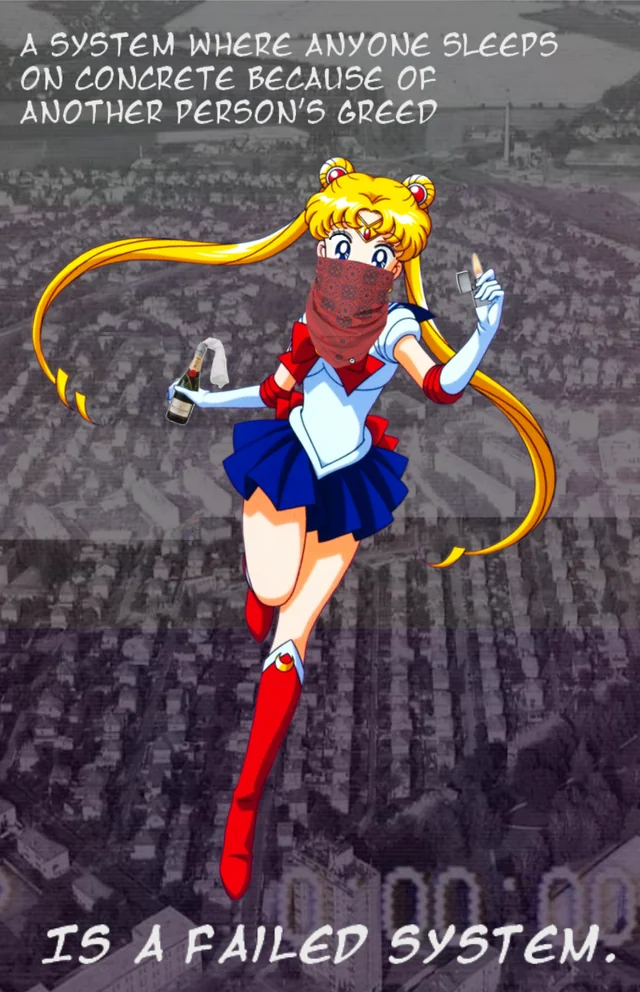this post was submitted on 25 Aug 2024
35 points (100.0% liked)
anime
11031 readers
109 users here now
Welcome to c/anime on Hexbear!
A leftist general anime community for discussion and memes.

Simple rules
-
Be nice.
-
Use spoiler tags.
-
Don't sexualise underage characters, including 1000 year old loli ones.
-
Don't post hentai here. This is an anime community.
High quality threads you should definitely visit
Gigathread: Good Anime Talks, Presentations, Conventions, Panels, etc
Piracy is good and you should do more of it. Use https://aniwave.to/ and https://4anime.gg/ for streaming, and https://nyaa.si/ for torrents. Piracy is the only means of digital protest that audiences have to fight poor worker treatment.
founded 4 years ago
MODERATORS
you are viewing a single comment's thread
view the rest of the comments
view the rest of the comments
Since this is being asked on Hexbear and not r/manga, I'd recommend "Sensou wa Onna no Kao wo Shiteinai," the manga adaptation of Alexievich's "The Unwomanly Face of War." That book is a collection of interviews with female soldiers of the Red Army that fought in the Eastern Front of WWII. As with all things USSR that see the light of day in the English speaking world, the author is an anti-communist, which is why she won the Nobel Prize for Literature for this book. However, the work is still worth reading because the interviewees are all Soviet war heroes and their deeply personal stories are the focus. Alexievich's "capital T Truth" fetishist shtick means that she doesn't often editorialize or interject, for example, every time Stalin is mentioned with "By the way, dear reader, remember that he ate all the grain" like Western accounts of socialist history do (though there are a billion footnotes crammed in the book version that "clarify" the interviewees' narratives with the anticommunist correct-think "fact checks"). The illustrations really bring to life the stories of the interviewees in a vivid way and so it's worth checking out.
Some great historical fiction include "A Bride's Story," set in 19th century Central and West Asia, with a great cultural anthropology-lite style narrative, and "Song of the Long March," which is set in Tang China and has a great portrayal of the deeply interwoven relationships between Han Chinese and Uyghurs in that historical period. I actually came across that work before all the Western atrocity propaganda started clogging the airwaves in the late 2010s and I'm personal grateful to it for pre-emptively being my first impression to the Uyghur Chinese people rather than having some shoddy copycat Holodomor 2.0 plagiarized slop become the introduction to that culture.
As a purely personal aside favorite, I'd also recommend "Fire Punch." It has a lot of the typical anime genre nonsense and really, the only reason I'd recommend it is that it has one of the best portrayals of an LGBT character in manga and anime. I was deeply struck by it personally and I've also seen heteronormative responses to the manga remark that the character humanized "LGBT individuals" as something beyond a "concept" for them.
Interesting. Any reason it's named after the long march despite being in a wildly different historical period?
I wanted to make a joke about that, but in seriousness, I would guess that the term "Long March" in contemporary Chinese culture, through the legendary status of that heroic campaign, has become rhetorically synonymous with a personal journey of perseverance and struggle basically akin to how Western cultures use the term "odyssey" from "The Odyssey." It's (justifiably) become one of those culturally enmeshed figurative terms, like how TERF island likes to append Dunkirk to the end of everything: "financial Dunkirk, political Dunkirk, etc."
The title likely is an allusion to that or maybe laconically pointing out just that the protagonist absolutely gets their daily steps in because they've meandered all around Tang China.
It's unfinished